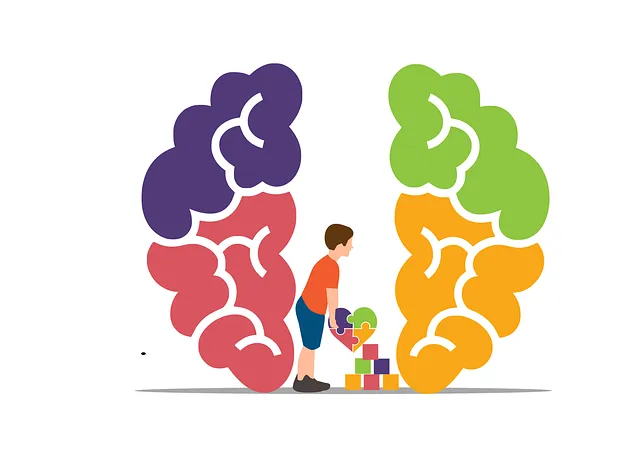Positive thinking exercises, offered by Arvada Kaiser Permanente behavioral health services, are powerful tools in mental healthcare. These exercises cultivate optimistic attitudes and reframe negative thoughts, contributing to improved well-being and emotional resilience through self-awareness promotion, challenging unhelpful thought patterns, fostering cultural sensitivity, and acting as a burnout prevention strategy. Regular engagement supports effective coping mechanisms and better communication among participants. Incorporating daily practices like affirmations, mindfulness, or gratitude journaling helps reprogram thought patterns, enhancing decision-making, decreasing stress levels, improving mood, and increasing life satisfaction. These techniques also contribute to mental illness stigma reduction and foster understanding for oneself and others facing challenges.
Positive thinking exercises have emerged as a powerful tool for enhancing mental well-being. This article delves into the practice, offering a comprehensive guide on how to integrate positive thinking into daily life. We explore successful initiatives like Arvada Kaiser Permanente Behavioral Health Services, known for its impactful programs. By understanding the benefits of consistent practice and learning strategies to overcome challenges, readers can unlock their potential through this transformative process. Discover how these exercises can improve overall mental health, with tips on tracking progress.
- Understanding Positive Thinking Exercises: A Brief Overview
- Arvada Kaiser Permanente Behavioral Health Services: An Introduction
- Integrating Positive Thinking into Daily Life
- The Benefits of Consistent Practice
- Overcoming Challenges and Tracking Progress
Understanding Positive Thinking Exercises: A Brief Overview

Positive thinking exercises are a powerful tool within the realm of mental healthcare, particularly offered by organizations like Arvada Kaiser Permanente behavioral health services. These exercises aim to cultivate optimistic attitudes and reframe negative thoughts, contributing to improved well-being. By integrating positive psychology into daily routines, individuals can enhance their emotional resilience and overall life satisfaction.
The effectiveness of these exercises lies in their ability to promote self-awareness and challenge unhelpful thought patterns. Through various techniques, such as gratitude journaling or cognitive reframing, individuals learn to identify and transform negative perspectives. This process fosters cultural sensitivity in mental healthcare practice, ensuring that approaches are tailored to diverse backgrounds and experiences. Moreover, regular engagement with positive thinking exercises can act as a burnout prevention strategy, fostering a sense of optimism that supports effective coping mechanisms and better communication strategies among participants.
Arvada Kaiser Permanente Behavioral Health Services: An Introduction

Arvada Kaiser Permanente Behavioral Health Services offers a range of support tailored to enhance mental well-being. As part of their comprehensive care approach, they prioritize self-care practices, integrating them into daily routines to foster resilience and overall happiness. The behavioral health team comprises professionals dedicated to providing personalized therapy and guidance, empowering individuals to navigate life’s challenges with increased coping mechanisms.
For those seeking assistance, Arvada Kaiser Permanente offers various programs and resources, including individual counseling, group support sessions, and community outreach initiatives. Their mission extends beyond treatment; they advocate for mental health policy analysis, ensuring accessible and effective care for all. Through self-awareness exercises and educational workshops, the organization equips individuals with tools to promote positive thinking and cultivate a healthier mindset.
Integrating Positive Thinking into Daily Life

Incorporating positive thinking into daily routines is a powerful step towards enhancing overall well-being, and Arvada Kaiser Permanente behavioral health services offer valuable guidance in this regard. By fostering a mindset that focuses on optimism and gratitude, individuals can experience significant improvements in their mental resilience. One practical approach is to start each day with a positive affirmation or a grateful list, setting the tone for a more optimistic outlook. Simple practices like reflecting on personal achievements, no matter how small, or acknowledging the beauty in everyday moments can shift one’s perspective over time.
This behavioral change is further supported by Empathy Building Strategies and Stress Management techniques taught through Kaiser Permanente’s resources. These strategies empower individuals to navigate challenges with a calmer mind and a more positive lens. By combining these practices with Resilience Building exercises, people can cultivate an unshakeable inner strength that enables them to thrive in all aspects of life, from personal relationships to career pursuits.
The Benefits of Consistent Practice

Consistent practice of positive thinking exercises offers a multitude of benefits for mental and emotional well-being. Studies have shown that regular engagement in activities like mindfulness, gratitude journaling, or compassion cultivation practices can significantly reduce stress levels, improve mood, and enhance overall life satisfaction. These exercises promote a healthier perspective by reframing negative thoughts into more constructive ones, leading to better decision-making and problem-solving skills.
At Arvada Kaiser Permanente behavioral health number, we emphasize the importance of these practices as part of our Healthcare Provider Cultural Competency Training programs. By incorporating compassion cultivation techniques into daily routines, individuals can foster a sense of inner calm and resilience, even in challenging situations. Moreover, regular practice contributes to Mental Illness Stigma Reduction Efforts by promoting understanding and empathy, not just for oneself but also for others facing similar struggles.
Overcoming Challenges and Tracking Progress

Overcoming challenges is a significant aspect of any personal growth journey, and implementing positive thinking exercises can be a powerful tool in navigating through difficult times. When faced with life’s hurdles, it’s easy to get caught up in negative thoughts and feelings, but training your mind to focus on optimism and self-belief can create a remarkable shift. Behavioral health professionals at Arvada Kaiser Permanente emphasize the importance of adopting emotional well-being promotion techniques to foster resilience. By incorporating daily positive affirmations, mindfulness practices, or even keeping a gratitude journal, individuals can begin to reprogram their thought patterns.
Tracking progress is another essential component of this process. Regularly evaluating one’s thoughts and emotions allows for the identification of negative thinking patterns and enables individuals to recognize the effectiveness of their coping mechanisms. This practice encourages a sense of accomplishment as positive changes become more apparent over time, fostering a deeper connection with confidence-boosting strategies and empathy-building techniques.
Positive thinking exercises, as demonstrated by Arvada Kaiser Permanente Behavioral Health Services, offer a powerful tool for enhancing mental well-being. By integrating these practices into daily routines, individuals can experience improved resilience and a more optimistic outlook. Consistent practice not only brings numerous benefits but also helps overcome challenges through tracking progress. Remember that cultivating positive thinking is a journey, and with dedication, anyone can harness its transformative power, leading to a healthier and happier life. For personalized guidance, contact the Arvada Kaiser Permanente behavioral health team for expert support.






